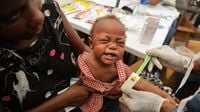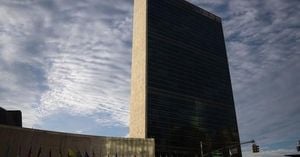On a sweltering afternoon in Port-au-Prince, Haiti, hundreds of people gathered at the College des Antilles, clutching empty bowls and plastic bags, desperate for a share of the food being distributed at a temporary shelter. The date was October 4, 2024—a snapshot that, according to Reuters, has become all too common as Haiti’s food crisis deepens and hope for relief grows ever more fragile.
By October 10, 2025, the situation had reached a grim milestone: 5.7 million Haitians, more than half the country’s population, were facing high levels of food insecurity. Of these, 1.9 million were living at what experts call the “emergency level”—a category marked by acute food shortages and soaring rates of malnutrition, as reported by the Integrated Food Security Phase Classification (IPC), a United Nations-backed index tracking hunger in global hotspots. The IPC’s latest report, widely cited by Reuters and ABC, paints a stark picture of hunger’s relentless march across the Caribbean nation.
And the outlook is only set to worsen. The IPC projects that by mid-2026, nearly 6 million Haitians—specifically, 5.91 million—will be food insecure, with almost 2 million still trapped at the emergency level. This projection, detailed in the IPC’s October 2025 report, underscores the scale of the crisis. Haiti, once known for its vibrant culture and resilient communities, now ranks among the five worst food-security crises in the world, with more than half of its people dependent on humanitarian assistance.
The roots of Haiti’s hunger crisis are tangled and deep. For six consecutive years, the country has been mired in economic recession. Each year has chipped away at livelihoods, eroded agricultural output, and left families with fewer resources to weather the storm. But the economic woes are only part of the story. Expanding gang violence has swept across the country, displacing families, shuttering small businesses, and making it nearly impossible for farmers to bring their crops to market.
In neighborhoods controlled by armed groups, daily life is fraught with danger and uncertainty. Farmers face extortion at every turn, forced to pay for the privilege of working their own land—if they can work it at all. Small businesses, the backbone of many communities, are routinely forced to close, unable to withstand the twin pressures of violence and economic collapse. The IPC report, as cited by Reuters, leaves little doubt: the fabric of Haitian society is being torn apart at the seams.
Yet, amid this bleak landscape, there are glimmers of hope—however faint. Martine Villeneuve, Haiti director at the non-profit organization Action Against Hunger, points to a modest but meaningful improvement: “The absence of the IPC’s most extreme phase of famine is encouraging,” she told Reuters. She also noted that 200,000 people were no longer at the emergency level of hunger, a sign that humanitarian interventions are making a difference, however small.
But Villeneuve is quick to temper any optimism with a sobering reality check. “The current response is, by nature, short-term and cannot be sustained without stronger, long-term investment to tackle the root causes of food insecurity,” she warned. Progress, she emphasized, remains fragile. Without a concerted effort to address the underlying drivers of hunger—economic collapse, violence, and political instability—any gains are likely to be short-lived.
Haiti’s government, for its part, has pledged to respond quickly to the growing hunger crisis. As reported by ABC, officials have acknowledged the scale of the problem and promised swift action. But pledges alone are not enough to fill empty stomachs or restore shattered livelihoods. The country’s capacity to deliver on these promises is hampered by the same challenges fueling the crisis: a battered economy, a fractured political system, and the ever-present threat of violence.
The sheer scale of need is staggering. On any given day, more than half of Haiti’s population relies on some form of assistance to survive. Humanitarian organizations, including Action Against Hunger, are stretched thin, working to provide food, medical care, and support to millions. But as Villeneuve and other experts have made clear, these efforts are a stopgap—critical, but ultimately insufficient without broader systemic change.
In the countryside, the situation is especially dire. Years of recession have devastated Haiti’s once-thriving agricultural sector. Fields lie fallow, crops rot in the ground, and farmers, once proud stewards of the land, are forced to abandon their homes in search of safety or opportunity elsewhere. In areas controlled by gangs, the risks are even greater. Extortion is rampant, and those who refuse to pay often face violence or the destruction of their livelihoods.
Meanwhile, in the capital and other urban centers, the economic collapse has triggered a cascade of hardship. Small businesses, already struggling to survive, are closing at an alarming rate. Jobs are scarce, wages have plummeted, and families are forced to make impossible choices every day: pay for food or medicine, send a child to school or keep them home to help earn money.
The international community has not turned a blind eye to Haiti’s suffering. Organizations like the IPC, Action Against Hunger, and the United Nations continue to sound the alarm, urging donors and governments to step up their support. But as Villeneuve pointed out, “the current response is, by nature, short-term.” What Haiti needs, she argues, is a sustained, long-term investment in its people, its institutions, and its future.
For many Haitians, however, such promises feel distant. The daily reality is one of scarcity and uncertainty. At the College des Antilles and countless other makeshift shelters across the country, mothers wait in line for hours, hoping there will be enough food for their children. Fathers scour the city for odd jobs, often returning home empty-handed. Children, their growth stunted by malnutrition, dream of a better tomorrow—a tomorrow that, for now, seems heartbreakingly out of reach.
As the world watches, the question remains: will Haiti receive the help it so desperately needs, or will millions more slip into the shadows of hunger and despair? The answer, for now, hangs in the balance—a testament to both the resilience of the Haitian people and the urgent need for global action.





